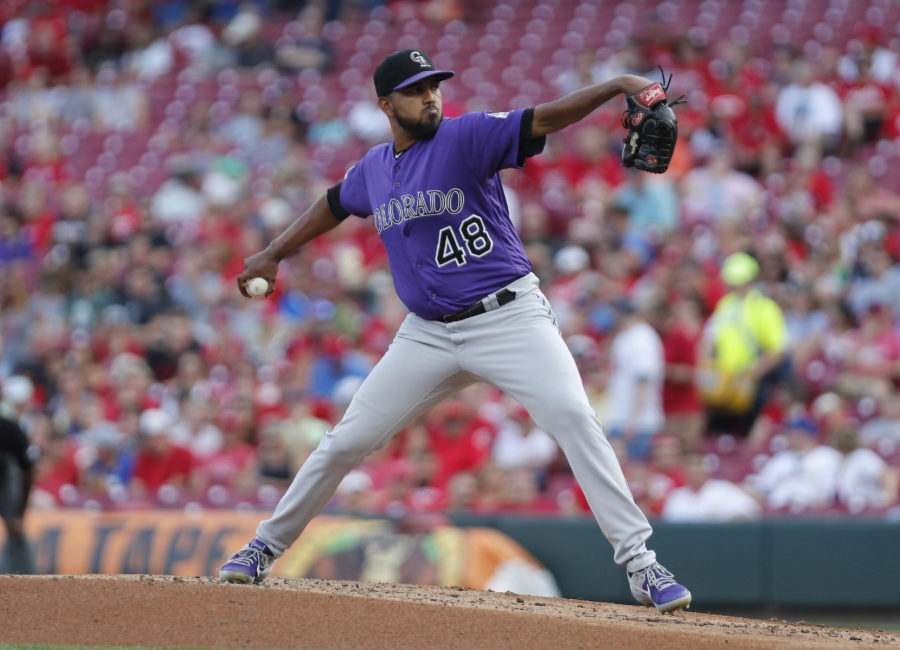German Marquez was a proverbial needle in a haystack. When the Tampa Bay Rays shipped him to the Colorado Rockies, the interest from the latter was based solely on potential.
Now, after a standout second half of last season, the club is still in search of who Marquez will be. He’ll either be a league-leading force or simply go the route of several other Rockies’ starters in the past – inconsistent, but effective in spurts.
The franchise would prefer he go down the brighter path and buoy their hopes of truly competing.
Against the Padres, Marquez was the slump-stopping, dominant hurler that the club has needed. With Kyle Freeland battling through struggles and two of the other five opening-day starters out of the mix as well, the burden’s been placed on Marquez and a rebounding Jon Gray.
The biggest key in his latest start was efficiency. Across eight innings, he threw a mere 93 pitches. Marquez’ aggressiveness led to 13 groundball outs and nine strikeouts. The two solo home runs he allowed are palatable when they’re merely blips on the radar.
In Marquez’ last start against the Astros, he threw 94 pitches in only five innings, allowing five earned runs along the way. The biggest difference between the two starts was the variance in location.
For Bud Black, walks are a killer. Allowing hits is an unavoidable facet of pitching, but throwing four balls and allowing a baserunner without a ball in play is.
The pitch chart for Marquez against the Padres was simple. Keep the balls on the corners, but don’t give up aggression within the zone to do it:
Graph courtesy of Statcast
Of the pitches that graced the middle of the zone, 10 were on first-pitch strikes. Getting ahead of hitters is a well-known recipe that’s proven to be effective, regardless of the opposition.
When placed in an 0-1 count, the league is hitting .330, compared to .350 on a 1-0 count. The real difference comes with two strikes. The average plummets to .153 in an 0-2 count.
On the day, Marquez had a hitter down two strikes, 10 different times. In those instances, he gave up only one hit – a single.
The pitch chart for his start against the Astros featured far more in the middle of the plate, with the edges more barren:
Graph courtesy of Statcast
Whether it was at the top of the zone or the bottom, Marquez struggled to keep the ball out of the danger zone in the middle. Of the eight hits given up, a majority came on balls that were in the middle of the plate. The lone exception came on Yuli Gurriel’s fourth-inning home run.
The results have to be given a disclaimer. One team – the Astros – is both the league’s best team, as well as it’s most patient. On the year, they’re the only club in the majors that’s both top-three in walks and top-three in fewest strikeouts.
Stomaching a five-run outing against a World Series favorite is one thing. Allowing 11 runs to the San Francisco Giants is another.
In his worst start of the year, Marquez was bludgeoned by one of the league’s bottom-five offenses in run production. Among his 86 pitches in only 2.2 innings, he induced a mere six swinging strikes.
Marquez’ curveball sat in the middle of the zone, while his fastballs were either non-competitive pitches or merely in the same spot:
Graph courtesy of Statcast
In the start, Marquez struggled mightily on his glove side, allowing the Giants to disregard the pitches altogether. Following the start, the main reasoning was a “lack of command.”
The culmination of both bad and good has resulted in a 4.75 earned run average – Marquez’ highest of any season in which he has started more than 20 games.
Take out the start against the Giants and that mark falls to 4.21. Remove his second-worst start – an eight-earned-run affair against the Cubs – and it falls even further to 3.89. In other words, he’s been a very good pitcher this year with a handful of terrible outings that have camouflaged that success.
For the Rockies, their hopes don’t simply reside in very good though. They’re hoping for elite. The same “elite” status that had Marquez towards the top of the league in both strikeouts per nine (12) and ERA (2.61) over 2018’s second half.
As far as Marquez’ recent extension at five years, $43 million, the Rockies will almost certainly be getting a great value.
For their hopes of postseason excellence, it’s going to take even more from the Venezuelan flamethrower.
